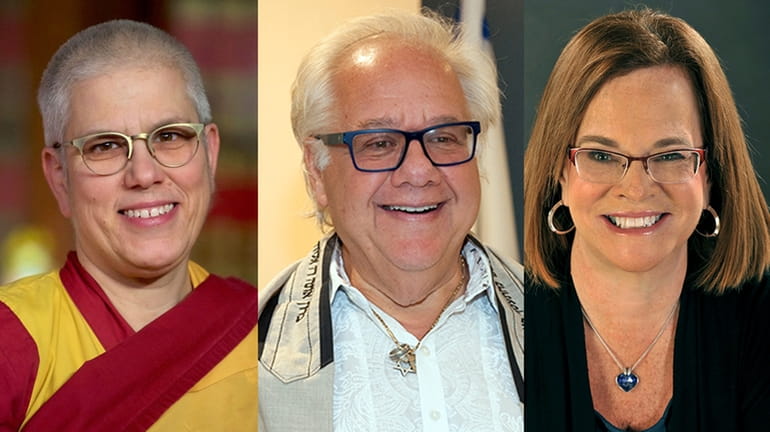Asking the Clergy: Finding love amid life's responsibilities

From left, Gen Kelsang Chenma of Kadampa Meditation Center Long Island, Rabbi Jay Weinstein of Congregation Simchat HaLev, and the Rev. Debra W. Haffner of Unitarian Universalist Fellowship of Huntington. Credit: Lesly Weiner; Rabbi Jay Weinstein; Suzanne Sheridan
A reader asks, "Is it possible to find love while we're consumed with life, going to college, finding the right job or taking care of a loved one?" This week's clergy discuss ways love can indeed be found at any age, at any time, from Jewish, Unitarian Universalist and Buddhist perspectives.
Gen Kelsang Chenma
Ordained Buddhist nun and resident teacher, Kadampa Meditation Center Long Island, Huntington
Buddhism has a very practical answer to this. All enlightened beings are born from compassion, and compassion is born from love. By loving others and contemplating their suffering, compassion develops in our hearts.
But to love others, we need to like them first! So Buddha taught this first step on how to develop affectionate love. We can easily develop this type of love in our daily activities. It involves recognizing the kindness we receive from others. When we start noticing this kindness, we begin to see it everywhere. While drinking your morning coffee, think about the kindness of the many people involved in making this delicious drink, from growers to importers to the barista at the cafe. In doing so we change our point of view of drinking coffee from a morning routine to a recognition of the kindness of others. We normally feel close to anyone we receive kindness from.
Through contemplating the kindness of others, we make it easier to develop a warm feeling and a feeling of being close to others. This is the beginning of developing love. Spend the day noticing kindness, and you will feel your heart explode with love and gratitude.
The Rev. Debra W. Haffner
Transitions minister, Unitarian Universalist Fellowship of Huntington
The love of a true friend is sacred. Friendships offer us affection, empathy, wisdom, truth telling, unconditional acceptance, trust and loyalty.
The Jewish and Christian Scriptures address friendship. In Genesis, God and Abraham are called friends. In Exodus 33:11, God spoke to Moses “face to face … as a man speaks to his friends.” Proverbs 18:24 says, “some friends play at friendship, but a true friend sticks closer than our nearest kin.” Jesus tells the Apostles, “I have called you friends, because I have made known to you everything.” (John 15:15)
In his essay on friendship, Ralph Waldo Emerson, a Unitarian, famously wrote, “the only way to have a friend is to be one.” Friendship is not a passive venture. We must show up, we must be trustworthy, we must be vulnerable, we must speak to our friends from the best part of ourselves.
The term “just friends” usually means that a friendship is less important than a romantic one. But what if we understand that “just” comes from “justice"? “Just friends” love and nurture each other. “Just friends” listen to each other, are there for each other and offer unconditional regard. “Just friends” tell the truth, but always with kindness and compassion.
I hope you are blessed with “just friends.”
Rabbi Jay Weinstein
Congregation Simchat HaLev, Woodbury
Love is a core Jewish value. Our sacred Scriptures command us to love. In Genesis 2:16, God said, “It is not good for the human to be alone; I will make a fitting counterpart for him.”
While the text is male-driven, we know everyone needs to feel love: him, her, they, them, us. Love is a sharing and giving of oneself. In Leviticus 19:18, we read, “Love your fellow as yourself.” Three times a day, we pray the words, “You shall love the Lord your God with all your heart and with all your soul and with all your might.”
In our connection to God, we learn to love others. God’s love for us is unconditional, as is the love between parent and child. Love is also complex and can be complicated. In romantic relationships, or between friends and others, love is often conditional, with rules, guidelines, outcomes, benefits and ramifications.
To love another, one must love oneself. Self-love must be unconditional. Then, and only then, will love in all of its forms be revealed.
DO YOU HAVE QUESTIONS you’d like Newsday to ask the clergy? Email them to LILife@newsday.com.
